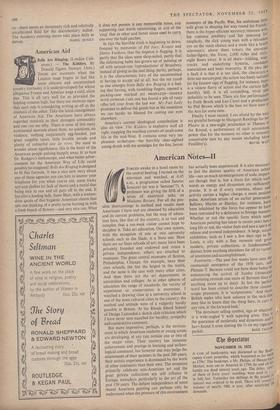American Aid
Donald Ogden Stewart. (Arts.) THERE are moments when the London stage begins to feel like some obscure and uncommitted country (certainly it is underdeveloped) for whose allegiance France and America wage a cold, silent war. This is all very well for us provided the bidding remains high, but there are ominous signs that each side is considering writing us off as the creature of the other. Take the latest consignment of American Aid. The Americans have always regarded musicals as their strongest commodity and one can see why. There is none of this nasty continental neurosis about them, no questions, no violence, nothing suspiciously egg-headed, just great singable tunes, little lovable people and plenty of colourful joie de vivre. No need to wonder about significance, this is the heart of the American people pulsing happily away fit to bust Dr. Rodgers's stethoscope, and what better adver- tisement for the American Way of Life could possibly be imagined? Bells Are Ringing is designed to fit this formula. It has a nice new story about one of those agencies you can hire to answer your telephone for you when you're out, some tricky sets and clothes (or lack of them) and a moral that being nice to one and all pays off in the end. It has also a leading lady, Janet Blair, with a tremen- dous quota of that hygienic American charm that sets one thinking of a pretty nurse busting in with a fresh bunch of flowers—and very nice too. What
it does not possess is any memorable tunes, any supporting cast worth mentioning, or any of the `zing' that in other and better times used to carry one over the bald patches.
In fact the horrible truth is beginning to dawn, fostered by memories of Pal Joey, Kismet and Damn Yankees, that. the impetus is flagging. It is partly that the ideas seem shop-soiled, partly that the infuriating habit has grown up of palming us off with second-rate 'reproductions' of Broadway instead of giving us the real thing; partly, perhaps, it is the characteristic fury of the uncommitted at having to accept aid at all; but the net result as one emerges from Bells Are Ringing is a feel- ing that having, with trembling fingers, opened a packing-case marked JET PROPELLED—HANDLE WITH EXTREME CARE one has found a pile of rusty rifles left over from the last war. My Fair Lady promises to deliver the goods but in the meantime we can hardly be blamed for casting our eyes elsewhere.
America's current ideological contribution is also on view. The Kidders is explosive stuff all right, mapping the smelliest corners of small-town life in the mid-West. It contains some very un- pleasant archetypes—the horribly clear-sighted young drunk with his nostalgia for the fine, heroic
moments of the Pacific War, his ambitious little wife given to sleeping her way round his friends: there is the hyper-efficient secretary/mistress With her costume jewellery and her yearning for simplicity, the slick young man with a relentless eye on the main chance and a smile like a brush salesman's; above them towers the universal father-figure, the Firm, 2,000 miles and sixty- eight floors away. It is all there—kidding, wise- cracks and underlying hysteria, confident materialism and basic insecurity. If the play has a fault it is that it is too slick, the characters a little too stereotyped, the action too finely tailored (at the faintest sign of flagging, for instance, there is a violent flurry of action and the curtain falls hastily). Still, it is all compelling, vivid and definitely to be seen. There are fine performances by Faith Brook and Leo Ciceri and a production by Phil Brown which is the best we have seen at the Arts for some time.
Finally I must record, I am afraid by the ways my grateful homage to Margaret Rawlings for her Phedre in a two-night_ production at Theatre in the Round, a performance of such astonishing power that for the moment no other is remotely conceivable (not by any means excluding Mille










































































 Previous page
Previous page